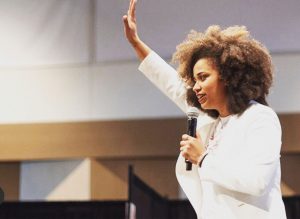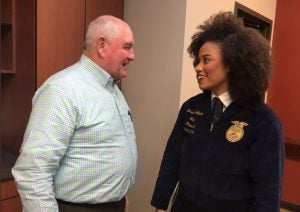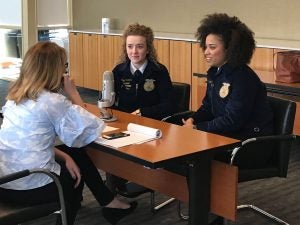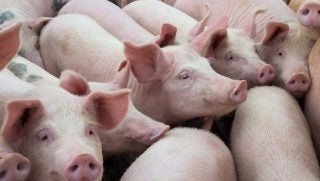“Welcome to the Future Farmers of America.” Looking around the classroom, then back at my agriculture teacher, I thought I had heard it wrong. Did she say farmers?
She continued, informing the nappy headed, non-agriculture background kid in the back of the classroom that because she was in an agriculture class, she was now a part of this youth organization for what I could only assume was for “future farmers.”
At that point in my life, I had already made up my mind about who I wanted to be and what I wanted to do. Agriculture was not it.
I mean, I had been exposed to agriculture growing up in California. It was unavoidable when living in the most prolific agriculture county in the country. However, I had never engaged with agriculture. My feelings toward the industry were the same feelings a young child would have driving down the I-5 toward Harris Ranch or on a long stretch of countryside with corn growing for thousands of acres long. Their imagination would run wild of what lies beyond the same scene of crop rows outside their window, and deep diving into marvelous worlds bigger than they could have ever imagined.
I always had this unnamable desire to find that. That something bigger, bigger than myself. I would have never imagined that something bigger would be cultivated in an industry I saw myself least likely to be a part of.

A short few weeks later, my agriculture teacher would approach me with an opportunity.
“Bre, your presentation was amazing. I love your speaking voice,” she said. “Would you like to try out for Creed speaking?”
Usually, I would have turned down the offer, considering that I was extremely shy about speaking in front of others and was already indifferent about agriculture. I also felt like an imposter to take such an opportunity. I didn’t grow up on a farm, raise livestock, own a tractor, or live on acres of land — none of that. I lived four blocks from my high school in a suburb of Lodi, California, was a Black child who saw that her peoples’ oppression was rooted in agriculture slave labor, and a Mexican child who saw her peoples’ struggles as today’s laborers in the industry.
I didn’t feel like my story belonged in agriculture.
But that day, I chose to say yes. If she could believe in me, then maybe I could learn to believe I belonged here, too? Not only belong, but become a part of something bigger.

Fast forward a decade later, I write to you as a graduating senior at California State University of Chico majoring in Agriculture Science and Education. I write to you as a California State University Emeritus Scholar and an outgoing student body-president of my university. I write to you with experiences as a past State and National FFA Officer — specifically, I am writing to you as the first female African American National FFA President (however, not the last). I write to you as an avid traveler of this great nation and a collector of experiences within agriculture and life.
As an Afro-Latina woman, my life was forever changed by agriculture. I grew up with the idea that people of color like me can’t thrive in this industry. Looking back at my story, I realized that it is possible.
However, I also write to you as a precursor to the difficult conversations we will have together. Even though I excelled and was able to reach success in this industry, it doesn’t mean that the path leading to this wasn’t difficult, it doesn’t mean the path forward from here isn’t difficult, and it doesn’t mean that the agriculture industry is rid of barriers to success for marginalized folks like me.

The anxiety of walking into all-white spaces — with their eyes glued to your hair or the color of your skin — is difficult. The tension of hearing misinformed, racist comments from others — speaking about your people directly to your face, and then hearing, “But you are different than them,” as if I am an anomaly of what is multicultural excellence — is difficult. The imposter syndrome built up in your head as you have never been exposed to certain areas in agriculture, but you are asked to speak on behalf of it is difficult. To witness the self-efficacy of marginalized communities plummet due to societal, economic, and physical barriers that keep them from opportunities to scale up in agricultural education and the agriculture industry is extremely difficult.
But just because they are difficult, doesn’t mean they shouldn’t be addressed.
I write to you because I believe that the future of agriculture can be more. Something bigger than us all. I believe that this is only possible through naming the issues, having conversations, and coming up with solutions. If we don’t, these difficulties are like chains-hindering us from attaining something bigger. Let’s chat again soon, hopefully moving forward to address the difficulties and arriving at something bigger.
Bre Holbert is a past National FFA President and studies agriculture science and education at California State-Chico. “Two ears to listen is better than one mouth to speak. Two ears allow us to affirm more people, rather than letting our mouth loose to damage people’s story by speaking on behalf of others.”



